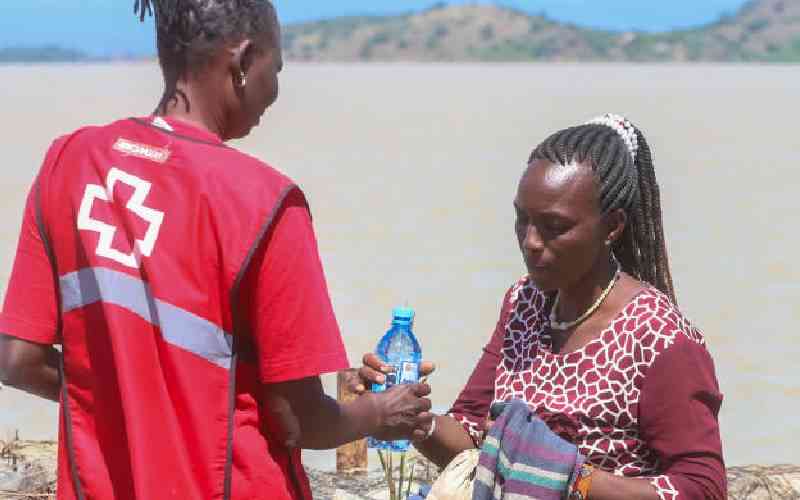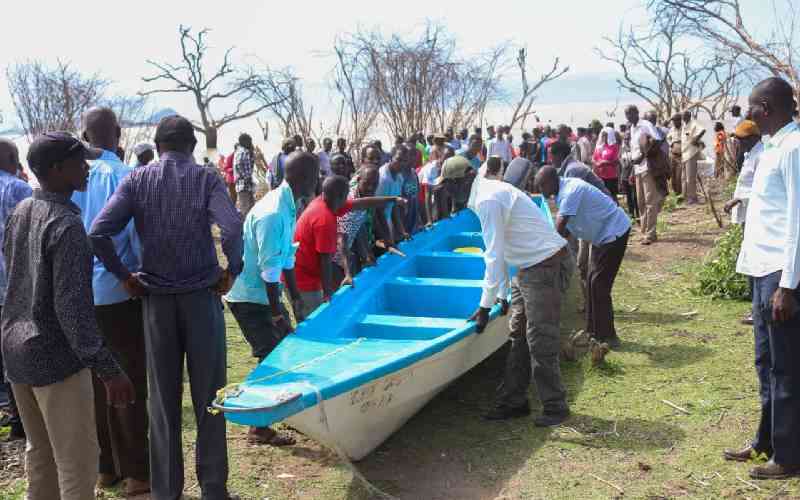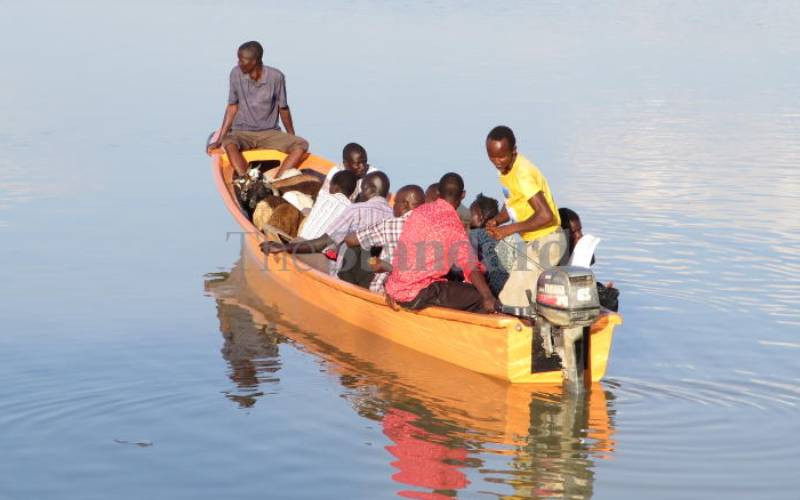You may be mistaken to think they attended the best diving schools in the world, or that they have just returned from the Olympic Games.
But as they line up on the rocky shores of Lake Baringo, these lifeguards (they refer to themselves as divers) have absolutely no idea what a springboard is.
Theirs is not a hobby, it is a daily job. One they are not paid for. A job not for the faint-hearted. From the rocks, they plunge into the cold and seemingly bottomless lake in an exciting acrobatic stunt, smashing their lean frames into the tide with their bare-chests.
For a couple of minutes, they disappear into the depths, leaving their spectators holding their breath.
Samwel Katurkana says they dive to save lives in the crocodile and hippo-infested Lake Baringo.
“I saw my neighbours’ son drown after his canoe capsized five years ago. He could not swim and he died just like that,” says Katurkana, wiping water off his face.
“Many lives have been lost in this lake. If only we had more lifeguards... my neighbour’s son would be alive today,” he says.
Dangerous calling
Katurkana, 28, is one of 10 lifeguards, all men, who have dedicated their lives to saving people around the lake. They are not paid for this and survive on handouts and the fish they catch.
The lifeguards live in villages that surround the lake. Chesiran, Katuwitt, Kakibich and Loruk villages surround Lake Baringo, a fresh water body with the highest population of crocodiles and hippos than any other in the Rift Valley. The lake is a popular tourist attraction and is internationally recognised as a bird migratory corridor and breeding habitat.
“We don’t know the depth of this lake, but it is very deep. If your boat capsizes and you cannot swim, consider yourself food to the crocodiles,” says Katurkana.
With no safety gear or floaters, the lifeguards arrive the shores of the lake at 6 a.m. every day. For 12 hours, they pass the day on the edge of the water, monitoring fishermen and children who come to the lake to draw water.
“We have to be here at daybreak because some villagers, especially those who live in the islands, travel to the mainland from as early as 4 a.m.,” says Vincent Kiprop, another diver.
Lack of safety equipment has never held them back. Kiprop, 20, recalls an incident last May when one of their colleagues drowned after he was trapped by a rock as he dived to save school children whose canoes had been driven off course by strong winds.
“We lost him but his death did not discourage us from serving the people who throng the lake. This is our calling,” he says.
Stay informed. Subscribe to our newsletter
For lack of fees, Kiprop dropped out school after his primary education. He now works full time as a volunteer lifeguard.
“I will go back to school if I get a sponsor, but for now, this is my life,” he says.
Mariko Sigar, 50, is not only a lifeguard but a guide to the other team members who he proudly calls “my sons.”
Due to his age, he provides surveillance on the lake using his canoe.
“I still dive but I now prefer using my canoe. I let the boys swim and guide them to avoid hippos or crocodiles. But there is urgent need for boats,” says Sigar, a father of 14.
He says they no longer have the material to make traditional canoes, locally known as Ngadich, as the reed that grew around the lake no longer grows.
When crossing the lake at night, the team uses a torch to scare away hippos who feed under the cover of darkness. Sammy Kiptoon, 18, the youngest of the lifeguards, says he joined the team after he dropped out of school. He has rescued 10 people in the six years he has been diving.
“I learnt the skill from observation. I decided to join the team when a friend drowned in the lake six years ago,” says Kiptoon, a resident of Chesiran village.
To provide for their families, the lifeguards fish when the lake is less crowded.
But even with the myriad of challenges they face, the lifeguards have only one request to the County Government of Baringo — a motorboat and fishing equipment.
“Lake Baringo is home to millions of fish species. With canoes, one has to paddle for four hours to the fishing spot. If we get a motorboat, we will provide for our families and still rush to the rescue of those who need help,” says Duncan Kibon, a 28-year-old father of three.
 The Standard Group Plc is a
multi-media organization with investments in media platforms spanning newspaper
print operations, television, radio broadcasting, digital and online services. The
Standard Group is recognized as a leading multi-media house in Kenya with a key
influence in matters of national and international interest.
The Standard Group Plc is a
multi-media organization with investments in media platforms spanning newspaper
print operations, television, radio broadcasting, digital and online services. The
Standard Group is recognized as a leading multi-media house in Kenya with a key
influence in matters of national and international interest.
 The Standard Group Plc is a
multi-media organization with investments in media platforms spanning newspaper
print operations, television, radio broadcasting, digital and online services. The
Standard Group is recognized as a leading multi-media house in Kenya with a key
influence in matters of national and international interest.
The Standard Group Plc is a
multi-media organization with investments in media platforms spanning newspaper
print operations, television, radio broadcasting, digital and online services. The
Standard Group is recognized as a leading multi-media house in Kenya with a key
influence in matters of national and international interest.









